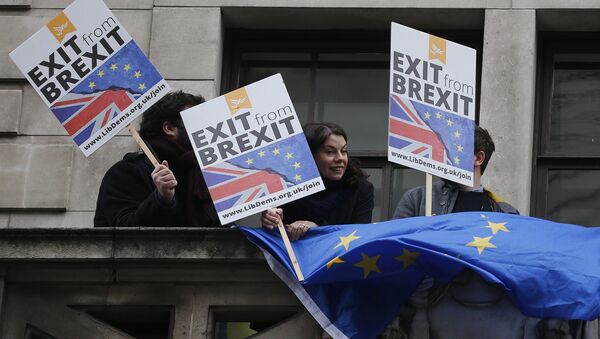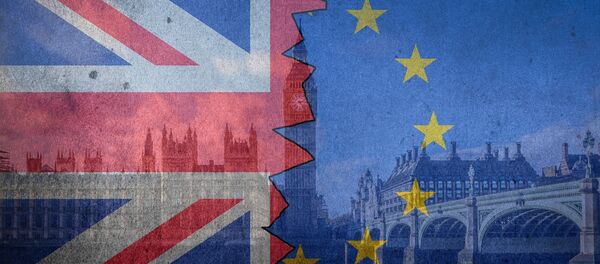Kristian Rouz — A new report finds the vast majority of Britain's private sector enterprises are expecting a ‘no-deal' Brexit to become reality. CEO scepticism of a possible Brexit deal increased after policymakers from both the UK ad EU failed to reach an agreement during last week's EU summit.
The Confederation of British Industry (CBI) found some 80 percent of British companies are planning to enforce contingency plans to minimize the anticipated disruptions in the cross-channel trade and capital flows stemming from a ‘hard Brexit'.
READ MORE: Brexit: 'Kicking Can Down the Road, the Can Will Get Kicked a Bit More' — Prof
The plans are set to go into effect as soon as December, unless Downing Street provides more clarity on the prospect of its Brexit agreement with the EU. Most companies are planning to introduce measures similar to those undertaken after the referendum on 23 June 2016, when the UK's sudden decision to leave spooked investors and resulted in a steep decline in the pound's FX rate.
"Businesses have displayed remarkable resilience since the referendum, but patience is now threadbare," Carolyn Fairbairn, Director General at CBI, said.
The CBI has called on the cabinet of Prime Minister Theresa May to maintain the closest ties possible with the EU after Brexit goes into effect. However, British manufacturers, primarily those in the North of England and parts of Wales, are eyeing lucrative export opportunities in case of a ‘hard Brexit'.
But the CBI observed a rather subdued sentiment across British businesses.
"Unless a withdrawal agreement is locked down by December, firms will press the button on their contingency plans," Fairbairn said. "Jobs will be lost and supply chains moved."
This might suggest that he May government could have a hard time navigating through the highly contradictory special interests of various groups within Britain as members of the cabinet are still trying to reach a consensus on a deal with the EU.
The UK's Brexit Secretary Dominic Raab said the most important sticking point is currently the status of Northern Ireland and the Irish border after Brexit.
READ MORE: EU Summit Ends With Brexit Deadlock, Migration, Security Threats in Spotlight
The EU is pressing for the Irish border to remain open post-Brexit, which the British Tories say would discredit the main point of Brexit as returning control over its own borders back to the UK. The EU then proposed keeping the Irish border open, whilst saying London could restrict the movement of people and capital across the Irish Sea.
But Ulster's Democratic Unionist Party (DUP) — which is part of May's ruling coalition — said it won't tolerate barriers to trade between Northern Ireland and the rest of UK.
In his Sunday Telegraph column, Secretary Raab wrote this issue — known as the ‘Irish backstop' — must be avoided if the EU wants a Brexit deal.
"The Prime Minister has rightly refused to rule out considering different approaches — including extending the implementation period for a limited period of a few months, as an alternative to the backstop," he said.
For its part, CBI said the standoff over the ‘Irish backstop', along with other Brexit-related concerns, have rendered British companies more inclined to believe there's no alternative but a ‘no-deal' Brexit.
Brexit is slated for 29 March 2019.
Additionally, 80 percent of companies polled by CBI said they have already reviewed their investment plans due to the lingering Brexit uncertainty and the risk of a ‘no-deal' separation.
However, the Department for Exiting the European Union reassured British businesses it's working on delivering a Brexit deal that works for the private sector, as well as for the rest of Britain.
The Department also said the government would provide necessary accommodation in case of a ‘no-deal' Brexit.
"In the unlikely event we leave the EU without a deal, we have issued over 100 technical notices to help businesses make informed plans and preparations," Brexit Department said in a statement.
The next summit between British and European leaders is slated for December. However, an additional round of Brexit talks could take place as soon as next month.


